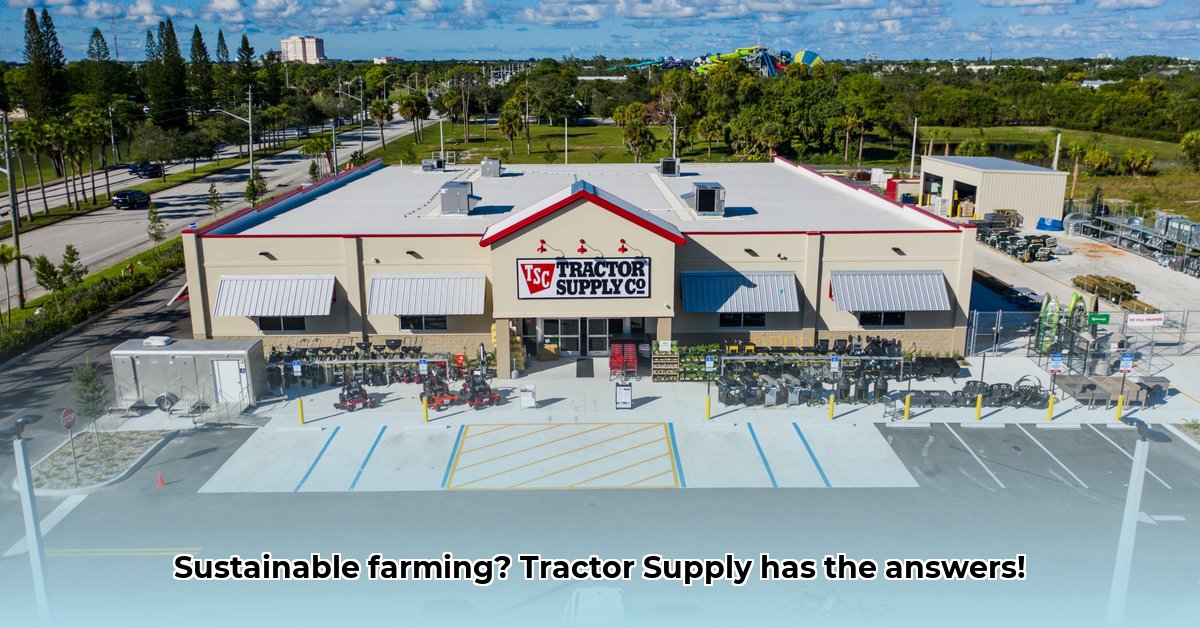
Tractor Supply's Role in Supporting Local Sustainable Agriculture
Tractor Supply Company (TSC) plays a significant, albeit complex, role in supporting sustainable agriculture, particularly within smaller, local farming communities. This article examines TSC's Beach Park, IL, location as a case study, exploring its product offerings, potential impact, and limitations in assessing its overall contribution to sustainable practices. We will analyze its positive contributions while acknowledging the need for further research to fully understand its environmental footprint. For example, you can find more information about organic seeds here.
Tractor Supply Beach Park IL: Product Offerings and Services
TSC Beach Park offers a range of products crucial for sustainable farming and gardening. Beyond heavy machinery, the store provides organic seeds for diverse crops, water-efficient tools, durable fencing for livestock protection, and high-quality animal feed. This readily available selection makes it a convenient one-stop shop for local farmers and gardeners. However, the sustainability of these products’ sourcing and production remains a key area needing further investigation. Do the fertilizers meet environmentally friendly standards? What are the sourcing practices for the animal feed? Such details are crucial for a complete assessment.
Analyzing TSC's Impact: Accessibility and the Limits of Data
TSC’s impact on sustainable agriculture in Beach Park is demonstrably positive in terms of access to resources. Local farmers and gardeners can easily obtain necessary supplies, boosting efficiency and reducing transportation emissions associated with sourcing from distant suppliers. The informal advice offered by knowledgeable staff further enhances this positive impact through practical guidance on sustainable techniques. This often-overlooked element of hands-on mentorship significantly contributes to building a local community committed to environmentally conscious agriculture.
However, a comprehensive quantitative assessment of TSC's overall environmental impact remains elusive due to limited publicly available data. Key information regarding supply chain sustainability, including sourcing practices, transportation emissions, and packaging waste, is unavailable. Therefore, while the positive influence of accessible resources and staff expertise is evident, the full extent of TSC's environmental footprint needs further investigation.
Actionable Intelligence and Risk Assessment
The following risk assessment matrix highlights potential challenges and mitigation strategies for TSC’s efforts in sustainable agriculture:
| Risk Factor | Likelihood | Impact | Mitigation Strategy |
|---|---|---|---|
| Supply Chain Disruptions | Moderate | High | Diversify suppliers; build strong, collaborative supplier relationships; explore alternative sourcing options. |
| Evolving Consumer Preferences | Moderate | Moderate | Continuously monitor consumer trends; adapt product lines to meet changing demands for sustainable products. |
| Increased Environmental Regulations | Moderate | High | Implement proactive compliance measures; invest in sustainable practices; transparently report on sustainability initiatives. |
| Intense Competition | High | Moderate | Enhance customer loyalty programs; provide exceptional customer service; highlight expertise in sustainable agriculture. |
This matrix underscores the need for proactive risk management and continuous improvement in TSC's sustainability initiatives. More transparency in supply chain operations is critical for mitigating these risks.
Practical Steps for Sustainable Farming with TSC
To maximize the benefits of TSC for sustainable farming, consider these steps:
- Careful Planning: Develop a comprehensive farming plan considering crop selection, seasonality, and efficient water usage.
- Product Comparison: Thoroughly evaluate TSC's product offerings, comparing cost and environmental impact with alternatives.
- Leverage Staff Expertise: Utilize the knowledge and advice of TSC employees to optimize sustainable practices.
- Prioritize Organic Options: Choose organic seeds, fertilizers, and other products whenever possible.
- Embrace Sustainable Alternatives: Implement water-wise irrigation, composting, and natural pest control methods.
Conclusion: Building a Sustainable Future Together
TSC Beach Park, IL, demonstrably contributes to local sustainable agriculture by providing access to essential resources and fostering a community of shared knowledge. However, a complete understanding of its environmental impact necessitates further research into its supply chain practices and a comparative analysis with competitors. Transparency and ongoing data collection are crucial for a more comprehensive assessment of TSC's overall contribution to a sustainable agricultural future. Supporting small-scale sustainable farming requires a collaborative effort, and TSC's role, while impactful, requires ongoing evaluation and improvement.